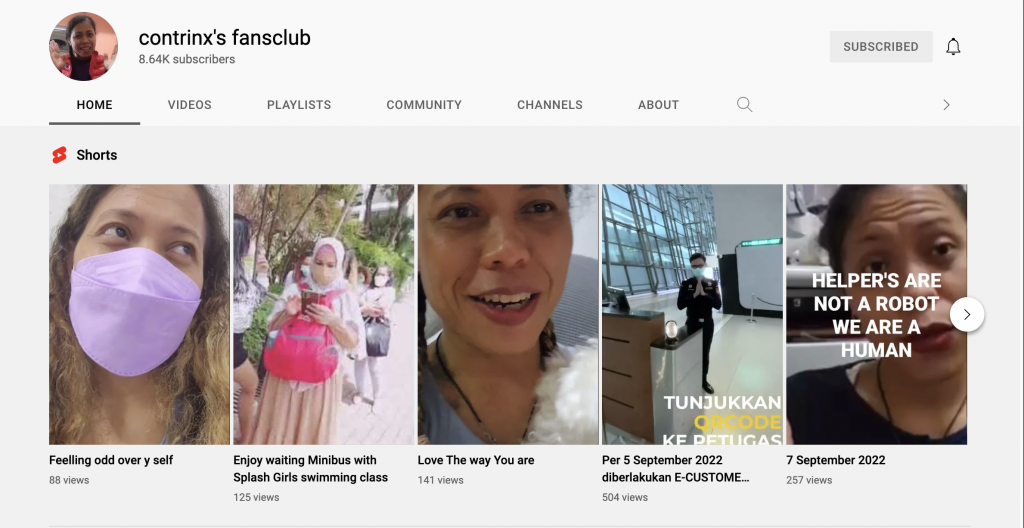An Indonesian domestic helper becomes an influencer in Hong Kong.
By Leopold Chen
From a Helper to a Star
“Helpers are human beings, not robots,” Contrinx, a 39-year-old domestic helper in Hong Kong, says in a YouTube video.
The Indonesian helper, who only reveals herself as Contrinx, becomes well known after her video criticising employers went viral with more than 332,000 views.
Though willing to voice up for the many domestic helpers in the city with her YouTube channel “contrinx’s fansclub” since 2020, Contrinx declines to reveal her name due to safety reasons.
In the one-minute YouTube video published on March 18, 2022, the helper roasted Hong Kong’s many employers of helpers, “what is it so proud to be rich?”
“WHAT IS IT SO PROUD TO BE RICH?”

“I feel tired working for you 24 hours a day without any day off. But you are not paying a lot, just HK $4,000 (US $509.56) something, is that much?” she questioned in the video.
Hoping to arouse Hong Kong employers’ awareness about the well-being of foreign domestic helpers and let all employers in the city understand their helpers more in the city, she spoke Cantonese in the video.
“I uploaded that video because many employers have become mentally abusive to domestic helpers after the outbreak of COVID-19. Most Hong Kong people have the problem of being double-standard,” says Contrinx.
“Employers treated helpers as virus carriers and did not allow us to enjoy our days off, but they went out as usual,” she adds, citing that many employers did not allow domestic helpers to spend their days off outside amid COVID-19 outbreaks.
Coming to Hong Kong 16 years ago, Contrinx realises the importance of having a healthy relationship with her employers and communication is the key.
Contrinx learned Cantonese by watching local TV programmes with the elderly in her first Hong Kong employer’s home.
“I think it is important to learn the local language when you work in a place, and I like learning languages,” she says.
“At my first Hong Kong employer’s home, I used to watch TV programmes with the elderly and asked him to do the translation for me. That is how I learned Cantonese,” she adds.
“Arrogant” Employers
Contrinx has been working as a foreign domestic helper since she was 18 years old when she first left her home to work in Singapore in 2001.
Her Singaporean employer even came all the way to visit her in Hong Kong in 2017, a decade after she left the family.
Having worked in Hong Kong since 2006, Contrinx says her employers in the city are not as pleasant as the one from the Lion City.
Contrinx switches her job every two years as she is tired of staying in an environment for too long, and she finds all her employers in Hong Kong are arrogant.
Recalling her first employer in Hong Kong, she says when the whole family went out to have breakfast in the morning, they would lock all the doors to their private rooms.
“In the first month, I kept quiet. In the second month, I told them, ‘Excuse me, if you do not trust me. Please do not hire me here,’” Contrinx says.
“They said my main duty was to take care of the child, but they did not allow me to touch the baby, let alone feed her or take a shower for her,” she adds.
Contrinx hopes that employers could change their attitudes and treat migrant domestic helpers like friends instead of mere employees.
“The connection between us is person-to-person, but many employers do not have such a mindset and treat us differently,” Contrinx says.
“The migrant domestic helper community is an essential part of Hong Kong, but many people just ignore it and deny our value,” she adds.
Hong Kong has 339,451 foreign helpers, that which mainly come from the Philippines and Indonesia, according to the government.
Asked about tips for migrant domestic helpers, Contrinx says one needs to be calm and not take employers’ emotions personally when facing mental abuse from employers.
“Once you work in Hong Kong, tell yourself you are valued. You have your quality, skills, and standard,” the YouTuber says.
Speak Out for Migrant Domestic Helpers
With more than 9,100 subscribers, Contrinx’s YouTube channel covers various topics, including immigration regulations, cooking tips, her daily routine, and domestic helpers’ stories.

Unlike the video that makes her popular, her videos are mainly filmed in English or Indonesian as they are mostly dedicated to domestic helpers.
“I started my YouTube channel because I want to change my way of conveying information with the help of audio-visual,” she says.
Before she started her YouTube channel, Contrinx used to deliver information to domestic helpers during her days off in physical venues and on Facebook.
In 2015, she used her Facebook page to criticise the Indonesian government for imposing too much burden on those who wanted to work in Hong Kong as domestic helpers.
“In Indonesia, before we become a domestic helper, we need to come through a lot of obstacles,” the Indonesian says.
“We have to go to private-run training centres, pay HK $15,000 (US $1920.68), and spend six months with no salary,” she adds.
“I want to voice out for the community of domestic helpers and meanwhile educate them. That is my passion,” Contrinx says.
Edited by Ella Lang
Sub-edited by Jack Deng







































